PRINCETON, NJ -- Eighteen percent of Americans say they would not vote for a well-qualified presidential candidate who happens to be a Mormon, virtually the same as the 17% who held this attitude in 1967.
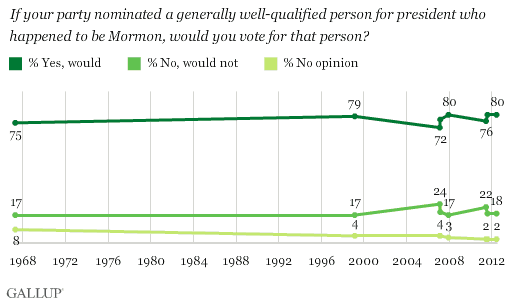
The exact percentage of Americans who resist the idea of voting for a Mormon has varied slightly over the eight times Gallup has asked the question, typically when a Mormon was running for president, including George Romney (1968 campaign), Orrin Hatch (2000 campaign), and Mitt Romney (2008 and 2012 campaigns). The percentage opposed to a Mormon president has averaged 19% since 1967 -- from a low of 17% at several points to a high of 24% in 2007. The current 18% is down from 22% a year ago.
Gallup originally asked the question in April 1967, after Mitt Romney's father, Michigan Gov. George Romney, announced the formation of an exploratory committee for the 1968 Republican nomination. At that point, George Romney was one of the two top contenders for the GOP nomination, along with the eventual winner, Richard Nixon.
Now, some 45 years later, George Romney's son Mitt will be the Republican nominee -- and the pattern of resistance to his Mormon religion has essentially not changed.
The Least Educated and Democrats Express the Most Reluctance
Reluctance to vote for a Mormon for president today is related to both education and partisanship. The percentage saying "no" to a Mormon candidate rises from 6% among those with postgraduate education to 23% among those with a high school education or less.
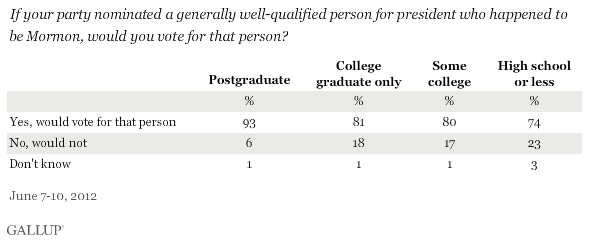
Negativity toward a Mormon candidate increases from 10% among Republicans to 18% among independents to 24% among Democrats.
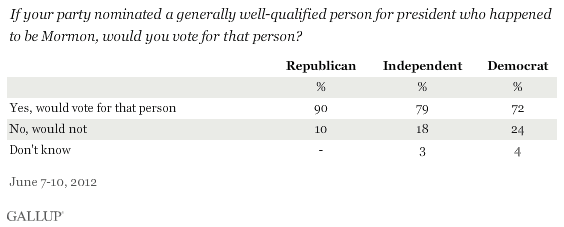
There is virtually no difference in resistance to a Mormon presidential candidate among Protestants, Catholics, and those with no religious identity; each group gives responses close to the national average.
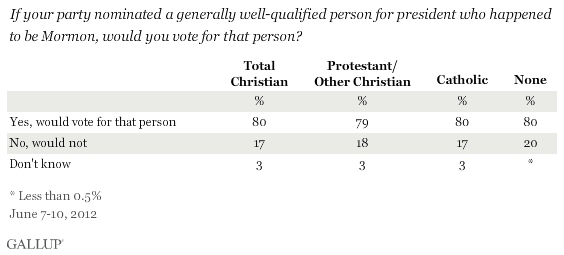
Impact on Mitt Romney's Candidacy Unclear
It is unclear how the current level of resistance to the idea of voting for a Mormon presidential candidate will affect the election. History shows that these types of attitudes in and of themselves are not an impediment to victory. For example, a May 1960 Gallup poll found that 21% of Americans said they would not vote for a well-qualified candidate who was a Catholic, but Catholic John F. Kennedy went on to win the presidency that fall.
It can be assumed that most Americans knew Kennedy was a Catholic, given the high level of visibility JFK's religion received in the campaign -- although Gallup did not assess that directly in 1960. In the current poll, however, 57% of Americans can correctly identify that Mitt Romney is a Mormon. The rest either misidentify him as a Christian or Catholic, or as having no religion, or simply say they don't know.
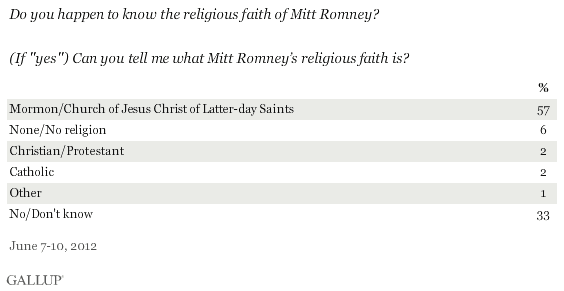
Americans who know that Romney is a Mormon are the most likely to say they would vote for a Mormon for president. Those who do not know Romney's religion are the most resistant to a Mormon candidate.

This suggests the possibility that as Romney's faith becomes better known this summer and fall, it could become more of a negative factor -- given that those who resist the idea of a Mormon president will in theory become more likely to realize that Romney is a Mormon as the campaign unfolds.
That things will actually work out this way, however, is far from clear.
Implications
Both George Romney in 1967 and his son Mitt Romney in 2012 faced the same level of prejudice against their religion, even though so much else has changed in politics and in U.S. society between these two points in American history. The stability of resistance to a Mormon presidential candidate over the past 45 years is an anomaly, given that resistance to a candidate who is black, a woman, or Jewish has declined substantially over the same period of time. Gallup will report on these trends later this week.
The actual impact of Romney's religion on the presidential race remains to be seen. At this point, Gallup Daily tracking data show that Romney and Barack Obama are essentially tied in trial heat balloting, and the example of Kennedy's victory in 1960 in the face of similar prejudice against a Catholic president shows that Romney could win in theory. At the same time, the fact that about four in 10 Americans do not connect Romney with the Mormon faith at this juncture holds out the possibility that his religion could become more of a factor between now and the election as it becomes more widely known.
Survey Methods
Results for this Gallup poll are based on telephone interviews conducted June 7-10, 2012, with a random sample of 1,004 adults, aged 18 and older, living in all 50 U.S. states and the District of Columbia.
For results based on the total sample of national adults, one can say with 95% confidence that the maximum margin of sampling error is ±4 percentage points.
Interviews are conducted with respondents on landline telephones and cellular phones, with interviews conducted in Spanish for respondents who are primarily Spanish-speaking. Each sample includes a minimum quota of 400 cell phone respondents and 600 landline respondents per 1,000 national adults, with additional minimum quotas among landline respondents by region. Landline telephone numbers are chosen at random among listed telephone numbers. Cell phone numbers are selected using random-digit-dial methods. Landline respondents are chosen at random within each household on the basis of which member had the most recent birthday.
Samples are weighted by gender, age, race, Hispanic ethnicity, education, region, adults in the household, and phone status (cell phone only/landline only/both, cell phone mostly, and having an unlisted landline number). Demographic weighting targets are based on the March 2011 Current Population Survey figures for the aged 18 and older non-institutionalized population living in U.S. telephone households. All reported margins of sampling error include the computed design effects for weighting and sample design.
In addition to sampling error, question wording and practical difficulties in conducting surveys can introduce error or bias into the findings of public opinion polls.
View methodology, full question results, and trend data.
For more details on Gallup's polling methodology, visit www.gallup.com.
